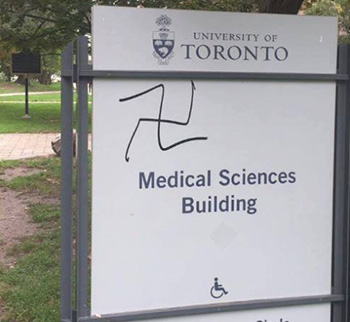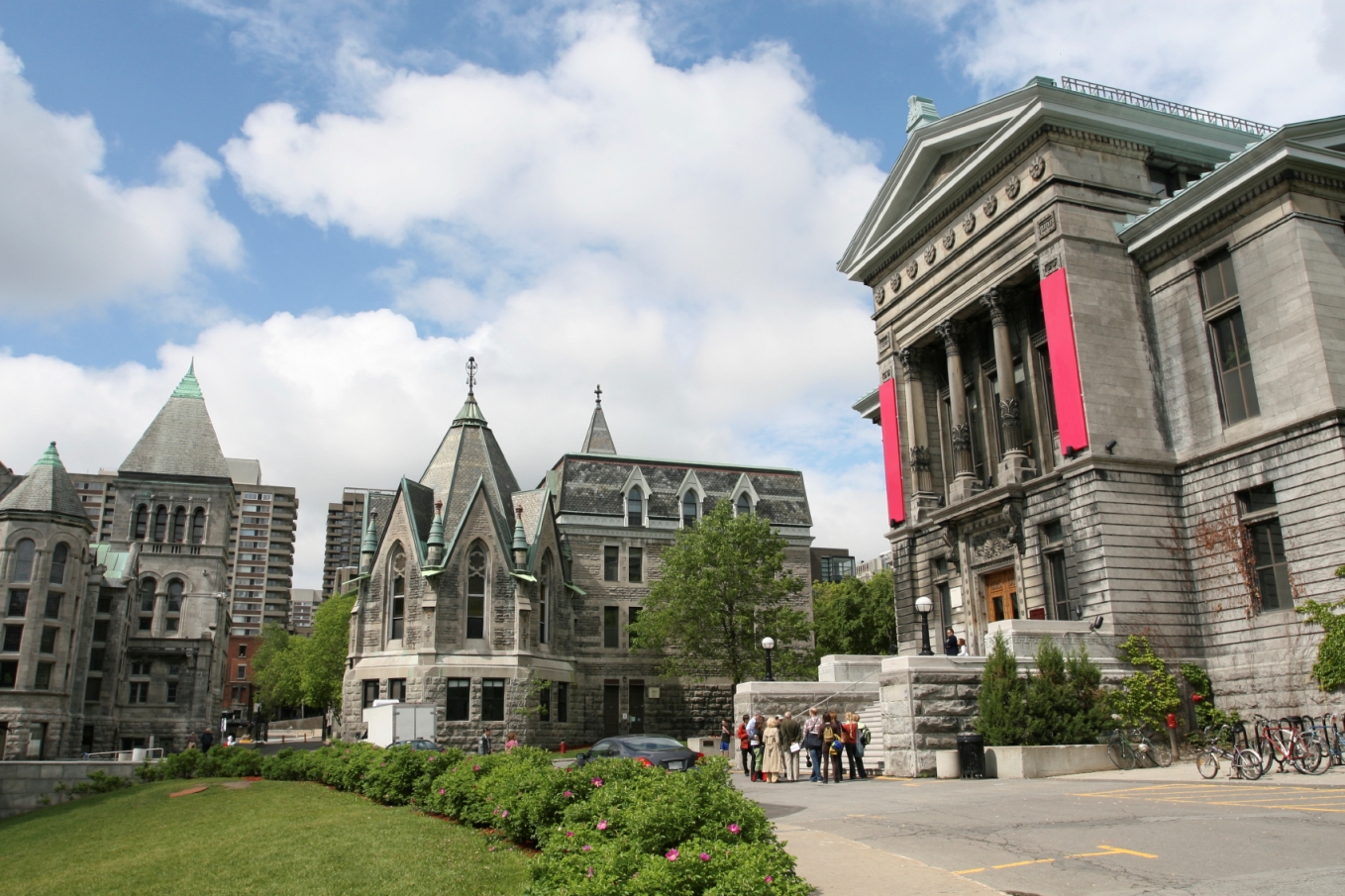Jewish officials with an eye on campus affairs are downplaying a provocative list of the 40 most hostile universities for Jewish students.
Four Canadian universities – the University of Toronto, McGill, McMaster and York – made the Algemeiner’s “1st Annual List of the U.S. and Canada’s Worst Campuses for Jewish Students,” released last month by the New York-based weekly publication.
U of T landed at No. 3, behind Columbia University in New York and Vassar College. McGill University in Montreal followed at No. 4, while McMaster in Hamilton was ranked at 13, and York University in Toronto came in at number 17.
“While cognizant of the inherent shortcomings and imperfections of the practice of list-making in general, we have taken great care to produce a thorough and credible ranking system that is driven by a comprehensive analysis of many data points representing the full scope of campus life,” the Algemeiner explained.
“We have also interviewed numerous experts, campus activists and students, to secure corroborative testimony and additional insights.”
Created in 1972 and describing itself as “the fastest growing Jewish newspaper in America,” the Algemeiner said it took “many” factors into account for its compilation: The number of anti-Semitic incidents on each campus; the number of anti-Israel groups, and the extent to which they are active; the Jewish student population and number of Jewish or pro-Israel groups; the availability of Jewish resources on campus; the success, or lack of, Israel boycott efforts; and the public positions of faculty members who are part of the boycott, divestment and sanctions (BDS) movement.
The information was then condensed into a point-grading system in order to generate the rankings.
But Hillel Ontario, which is active on nine university campuses in the province and works with some 21,000 Jewish students, believes the Algemeiner list “does not accurately represent the experience of most Jewish students on campus” and is “rather misleading.”
The list focuses only on “isolated” anti-Semitic and anti-Israel incidents, “which do not tell the complete story of the robust campus experience most Jewish students have,” Ilan Orzy, associate director of advocacy for Hillel Ontario, told The CJN in an emailed statement.
“While certainly anti-Semitism and anti-Israel activity on campus are troublesome, these same campuses are where our Hillels are thriving.”
A campus, he added, “cannot be judged on how good or bad it is for Jews based on whether anti-Semitic and anti-Israel incidents occur.”
Had the paper’s editors visited the Ontario campuses, “they would find that the campus climate is determined by the consistent efforts of people who love learning and Jewish life, and who consistently stand up for themselves, not by those who attempt to intimidate others,” Orzy said.
U of T was high on the list because it was where Israel Apartheid Week originated and has hosted “a considerable number of events in recent years portraying the Jewish state as barbarous and colonialist,” the Algemeiner explained. The school also saw a recent “proliferation of blatant anti-Semitism when numerous swastikas popped up around the campus.”
READ: MCGILL STUDENT BODY FINDS BDS ‘UNCONSTITUTIONAL’
The paper quoted the national director of Hasbara Fellowships Canada as saying that one regularly finds “orchestrated, organized anti-Israel programs and initiatives” at U of T.
Robert Walker, director of Hasbara Fellowships Canada, told The CJN that when contacted by the American paper, he “did not necessarily endorse U of T in that specific ranking. They just asked me for a quote about U of T.”
In a statement, Walker said that he would rank the Canadian universities differently, and that “this list should remind us that the crux of the challenges and opportunities on campus is bigger than an isolated incident – it’s about the empowerment of the next generation of Jewish students, and about winning over the next generation of non-Jewish thought leaders.”

McGill’s entry on the list notes that anti-Israel activists “repeatedly bring BDS motions before the student government, and finally passed one [in 2016] but when the student body later failed to ratify it, the activists vowed to continue their campaign.”
As well, the university’s student newspaper, the McGill Daily, “against which Jewish students filed a complaint, recently rejected charges of anti-Semitism but openly admitted to censoring pro-Israel content on the grounds that Zionism is a product of ‘settler colonial ideology.’”
McMaster made the list because two on-campus groups, Solidarity for Palestinian Human Rights (SPHR) and McMaster BDS, support the BDS drive and have anti-Israel supporters.
READ: MCMASTER UNDERGRADS ENDORSE BDS MOTION
Students at York University, meanwhile, “say the school has an ‘anti-Semitism problem,’ with faculty pushing anti-Israel, anti-Jewish agendas in the classroom, and administrators defending them when students and advocacy groups complain,” the Algemeiner said.
Aidan Fishman, B’nai Brith Canada’s campus advocacy co-ordinator and a law student at U of T, said he welcomes the ranking, though he doesn’t necessarily endorse it, but “there’s not very much” on the Algemeiner’s website about its methodology.
Fishman said he was “a little surprised” to see U of T rated the third-worst in North America and the worst in Canada, “because there’s a broad consensus among Jewish students in Toronto that York has a much worse anti-Semitic atmosphere than U of T.”
The Algemeiner’s ranking “appears outdated and does not represent the positive experience shared by most Jews on those and other campuses nationwide,” said Judy Zelikovitz, vice-president of university and local partner services with the Centre for Israel and Jewish Affairs (CIJA).
“We do not know the methodology behind how the list was compiled, but it does not correspond with our own qualitative research with students,” she added.
In a comment to the National Post, Zelikovitz said, “I’m not really sure where some of their information came from. Certainly they didn’t ask anybody here in Canada what was going on currently – that I can tell you.”
McMaster was “surprised” to find itself included on the list, Gord Arbeau, director of communications, told The CJN.
“The methodology used by the authors is unclear. Much of it appears to be anecdotal,” he said in an email. “We had no knowledge of this list prior to its online distribution, nor were we given opportunity to provide the authors with information about McMaster.”
The same sentiments were sounded by Althea Blackburn-Evans, director of media relations at the University of Toronto, who said she could not comment on the authors’ methodology “or how they came to those conclusions.”
Diversity and tolerance are “key values” at U of T, she added.
McGill and York, the other two Canadian universities named in the rankings, did not immediately respond to requests for comment.
The situation for Jewish students at Ryerson University in Toronto made another list, this one the Los Angeles-based Simon Wiesenthal Center’s (SWC) “2016 Top Ten Worst Global Anti-Semitic/Anti-Israel Incidents.”
Clocking in at No. 4 (tied with two other incidents), Ryerson, the SWC noted, saw students pass a pro-BDS vote, anti-Semitic graffiti, and the torpedoing of a motion to dedicate a week to Holocaust remembrance. Jewish students accused the groups Students for Justice in Palestine and the Muslim Student Association of staging a walkout to scuttle a quorum for the vote, and the motion was later passed unanimously by the Ryerson Students’ Union.
